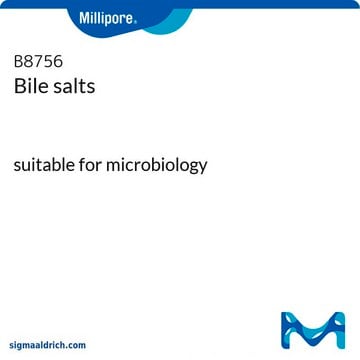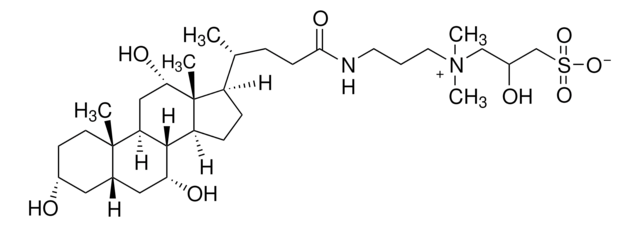27029
Sodium cholate hydrate
≥97.0% (dried material, NT)
Synonym(s):
3α,7α,12α-Trihydroxy-5β-cholan-24-oic acid sodium salt, Cholalic acid sodium salt
About This Item
Recommended Products
description
anionic
Assay
≥97.0% (dried material, NT)
form
powder
optical activity
[α]20/D +36±2°, c = 0.6% in ethanol (dry matter)
mol wt
micellar avg mol wt 900-1300
aggregation number
2-3
loss
≤5% loss on drying
CMC
9-15 mM (20-25°C)
solubility
H2O: 0.1 M
H2O: 100 mg/mL
HLB
18
SMILES string
O.[Na+].C[C@H](CCC([O-])=O)C1CCC2C3[C@H](O)CC4C[C@H](O)CC[C@]4(C)C3C[C@H](O)[C@]12C
InChI
1S/C24H40O5.Na.H2O/c1-13(4-7-21(28)29)16-5-6-17-22-18(12-20(27)24(16,17)3)23(2)9-8-15(25)10-14(23)11-19(22)26;;/h13-20,22,25-27H,4-12H2,1-3H3,(H,28,29);;1H2/q;+1;/p-1/t13-,14+,15-,16-,17+,18+,19-,20+,22+,23+,24-;;/m1../s1
InChI key
MUVVIYFKOVLQHL-RCVKHMDESA-M
Looking for similar products? Visit Product Comparison Guide
Related Categories
General description
Application
- Optimization in Transdermal Drug Delivery: Applied in the formulation of ultra-elastic nanovesicles, sodium cholate hydrate enhances the bioavailability and anti-inflammatory efficacy of deflazacort, demonstrating its potential in transdermal drug delivery systems, which can be adapted for diagnostic purposes (Ali et al., 2021).
- Nanocarrier Formulations for IVDs: The study utilizes sodium cholate hydrate in the surface modification of bilosomes, serving as a functional and biocompatible nanocarrier for hybrid compounds, a method applicable to the formulation of innovative IVD reagents (Waglewska et al., 2020).
- IVD Reagent Formulation for Skin Delivery: Sodium cholate hydrate is featured in the development of nano-transfersomes for the delivery of antioxidants, showcasing its role in creating skin-applied diagnostic reagents that offer antioxidant and anti-aging effects (Avadhani et al., 2017).
- Sorting and Separation Techniques in Nanotechnology: Demonstrating the affinity-mediated sorting order reversal, sodium cholate hydrate is critical in density gradient ultracentrifugation techniques, highlighting its utility in the precise sorting and preparation of materials for diagnostic assays (Jang et al., 2016).
Hazard Statements
Precautionary Statements
Hazard Classifications
Aquatic Chronic 3
Storage Class Code
11 - Combustible Solids
WGK
WGK 3
Flash Point(F)
Not applicable
Flash Point(C)
Not applicable
Personal Protective Equipment
Certificates of Analysis (COA)
Search for Certificates of Analysis (COA) by entering the products Lot/Batch Number. Lot and Batch Numbers can be found on a product’s label following the words ‘Lot’ or ‘Batch’.
Already Own This Product?
Find documentation for the products that you have recently purchased in the Document Library.
Customers Also Viewed
Our team of scientists has experience in all areas of research including Life Science, Material Science, Chemical Synthesis, Chromatography, Analytical and many others.
Contact Technical Service












